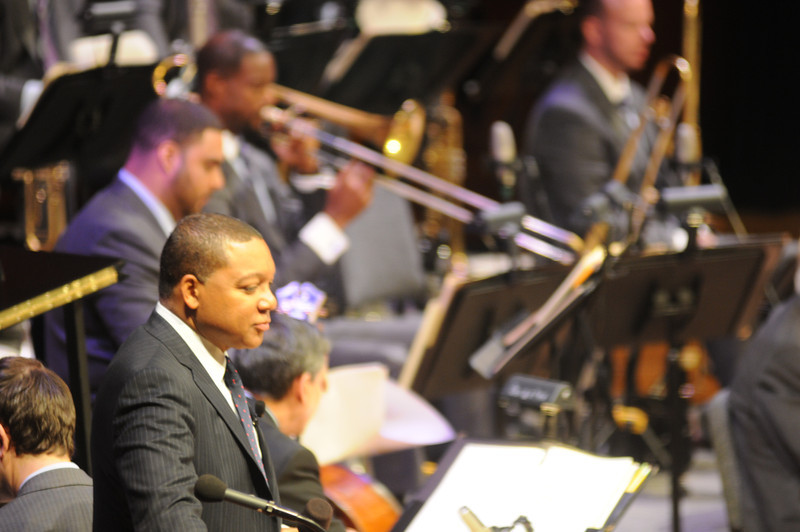
News
Progressive Labor Party Organizes Solidarity March With Harvard Yard Encampment

News
Encampment Protesters Briefly Raise 3 Palestinian Flags Over Harvard Yard

News
Mayor Wu Cancels Harvard Event After Affinity Groups Withdraw Over Emerson Encampment Police Response

News
Harvard Yard To Remain Indefinitely Closed Amid Encampment

News
HUPD Chief Says Harvard Yard Encampment is Peaceful, Defends Students’ Right to Protest
Wynton Marsalis Discusses History of Jazz

Excitement abounded in Sanders Theatre last Thursday night as hundreds of students, Cambridge residents, and visitors waited to see Wynton Marsalis perform and speak about jazz history. Marsalis is an accomplished, Grammy award-winning trumpeter recognized by the United Nations and the U.S. State Department for his contributions to music and culture.
Accompanied by the Jazz at Lincoln Center Orchestra, Marsalis returned to Harvard for the fifth time on Thursday, continuing his popular and sold-out musical lecture series “Hidden in Plain View: Meanings in American Music.” Each lecture has taken a unique approach to the study of jazz music, highlighting facets of performance like the intersection of music and dance.
This time around, in “Setting the Communal Table: The Evolution of Jazz Orchestra,” Marsalis fused his lively accounts of jazz history with the Lincoln Center Orchestra’s renditions of popular music pieces, including those by Duke Ellington, Louis Armstrong, and Fletcher Henderson.
Following a warm welcome from the crowd, Marsalis dove right into personal stories, including a detailed account of the first time he played a French horn. He also touched on broader themes, including descriptions of how the traditions and hardships of black culture influenced the spread of jazz music. Marsalis explained that the struggles of black Americans shaped the lyrics, style, and popularity of jazz. He also said that ballroom dancing and the social scene of the 1920s encouraged and was encouraged by the jazz music of the age.
"He also hit on a lot of important cultural items too, talking about the historical leadership of jazz musicians in racial desegregation," says Daniel A. Henderson, a lecturer in the department of music specializing in jazz harmony and improvisation. “I feel like it was billed as a lecture but it was like a lecture/sermon/concert, which is the ultimate learning combination to me."
Beyond his anecdotal recounting of the music’s social and cultural history, Marsalis demonstrated the intricacies and histories behind trombones, reeds, and trumpets. As the orchestra played, Marsalis narrated what they were performing, highlighting subtleties and helping the audience appreciate the complexity of all the instruments in the ensemble. Marsalis asked the orchestra to play different 1920s jazz hits in parts, adding and subtracting instruments to show the effect of each.
"He got into serious musical detail which is really exciting for me and for the class,” Henderson says. “He was talking about the evolution of instrumentation and jazz arranging. You hardly ever get to hear someone so in depth about instrumentation and arranging."
“Marsalis is not only a world-class musician but also a captivating and engaging speaker,” says Joe L. Choe ’17, a jazz enthusiast and musician. “His message was made that much more effective because he incorporated live music into it. The music added texture to his speech and provided a context for the audience.” According to Choe, “There was never a dry moment, and every time his ensemble played, it was as if the audience was taken to a different world.”
For Abby L. Westover ’17, the show was a chance to learn more about jazz in the 1920s, a musical era in which she is interested. “I've always enjoyed [jazz], but have never been extremely knowledgeable about the different nuances and specific names,” she says.
Westover says that the orchestra’s performances and Marsalis’s commentaries were in perfect union. “I was completely floored at the talent and artistry Marsalis and the orchestra exhibited,” she says. “I came out of the show wanting to learn more about jazz and having a much higher appreciation for it.”
Cherie Z. Hu ’17, who is currently taking Henderson’s class, Music 153: Jazz Harmony, found ties between the class and the event. “In the past few weeks, we’ve been doing harmonic analysis of basic jazz pieces, which really contributed to my liking of the show,” she says. “Last week in class, we learned about a musical concept called the ‘circle of fifths,’ which says that some of the most famous jazz songs use a similar loop over and over again…. I noticed that a lot of the songs during the concert used the circle of fifths, which I thought was really cool."
Hu had previously attended a jazz concert hosted by the same orchestra at Lincoln Center. She says that Thursday night’s show was a lot more engaging due to its format and amount of audience interaction. “My last jazz concert at the Lincoln Center was a really good and I really liked it, but the Marsalis concert went much more in depth and I came out learning a lot more about the background of music rather than just listening to it for a few hours.”
In addition to speaking of the history and composition of jazz, Marsalis spoke of each individual’s artistic potential. He discussed how musicians during the early jazz period learned through their music that each person offered a world of possibilities. “There is nothing deeper, or more personal, than interest,” Marsalis said. These encouraging words were received warmly by an admiring and enthusiastic audience.
Want to keep up with breaking news? Subscribe to our email newsletter.
